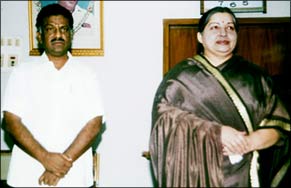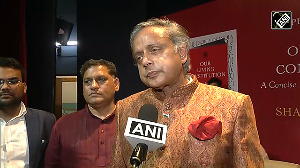 Independent of what the Karnataka high court and the Supreme Court might decide in Jayalalithaa’s conviction and sentencing in the coming days, weeks and months, political arguments based on ‘popular mandate’ theory are plain untenable, says N Sathiya Moorthy.
Independent of what the Karnataka high court and the Supreme Court might decide in Jayalalithaa’s conviction and sentencing in the coming days, weeks and months, political arguments based on ‘popular mandate’ theory are plain untenable, says N Sathiya Moorthy.
Can courts punish popular leaders for offences under the law? That is the question that is being debated by supporters of former Tamil Nadu chief minister Jayalalithaa following her conviction by a special court in Bangalore which handed down a four-year jail term and Rs 100 crore fine on her in a corruption case.
That is also the kind of defence the ruling All India Anna Dravida Munnetra Kazhagam supporters and sympathisers are proffering over the violent protests unleashed across Tamil Nadu, and to a much lesser extent in Bangalore, following her conviction and imprisonment, saying it was an inevitable consequence of a member of the subordinate judiciary punishing a mass leader.
But that cannot explain the cadre conduct. It cannot explain away why those cadres read meanings and motives into the judgment, and made defamatory statements on television and in posters that they had plastered all across the state.
One such poster stood in the name of an incumbent minister of state, another in the names of a member of the legislative assembly and a sitting member of Parliament, all of them belonging to the AIADMK. As was to be expected under the circumstances, the three promptly denied any involvement.
All this and other questions have acquired a new relevance after the opposition Dravida Munnetra Kazhagam in the state, shedding its confused reluctance of the early days of Jaya’s conviction, moved the Madras high court, seeking action against those who ‘defamed’ the judiciary.
The high court bench seemed particularly interested in knowing more details about an anti-judiciary resolution passed by the Vellore municipal corporation in the wake of Jaya's conviction. The two-judge bench has since asked the DMK lawyers to provide a copy of the resolution, before proceeding in the matter.
It’s one thing to criticise a judicial pronouncement -- which is what the basis and the spirit of ‘appeals’ against a lower court judgment entail. It is another to target the judge in particular and the judiciary otherwise.
Courts have held that such offences are not defamatory in nature for the individual judge affected to initiate civil/criminal proceedings against those behind it.
Instead, they are plain and simple ‘contempt of court’ cases. Such offences, if left unpunished, have the potential to demoralise individual judges cutting across the judicial spectrum. It ultimately impacts on the image and role of the judiciary as a whole.
If politicians have a popular mandate to perform a particular task, the judiciary is conferred another task -- the task of protecting the Constitution and enforcing the laws that the political class deems fit to enact through such other constitutional institutions as the legislature and the executive.
In the post-Emergency poll-induced ‘nine assemblies dissolution case’, the Supreme Court conferred greater legitimacy on popular mandate than the Constitution, and possibly the electorate too intended when it upheld the Janata Party government dismissing nine state governments and dissolving their respective assemblies.
The court held that by losing the popular mandate very badly in the 1977 Lok Sabha polls, the ruling Congress party in those states had lost the right to continue in power.
The roles got reversed three years later. Returning to power on the strength of a popular mandate after the ‘Janata experiment’ failed, Prime Minister Indira Gandhi sacked nine state governments and their assemblies, citing the very same reason.
In the S R Bommai case in 1994, the court held that the fate of a government could be tested only on the floor of the house. It further ordered that all dismissals of elected state governments and all dismissals of their legislature should be compulsorily upheld by the judiciary.
In their wisdom, the executive and the legislature, ever ready to upturn inconvenient judicial pronouncements through new pieces of legislation, have left the Bommai case verdict untouched.
If anything, in the Nitish Kumar dismissal case in 2005, there was popular acceptance when the Supreme Court applied the Bommai case verdict and restored a sacked state government and legislature in Bihar.
Independent of what the Karnataka high court and the Supreme Court might decide in Jayalalithaa’s conviction and sentencing in the coming days, weeks and months, political arguments based on ‘popular mandate’ theory are plain untenable.
In the ‘quo warranto case’ pertaining to Jayalalithaa being sworn in chief minister in 2001 despite a pending conviction against her in the ‘TANSI land deal case’, the Supreme Court had held that pending such conviction, a person cannot hold elected office. In fact, the court held that Jayalalithaa’s nomination as chief minister by then Governor Fathima Beevi -- incidentally, the first woman-justice of the Supreme Court -- was ab initio void.
In the 2001 assembly elections, Jayalalithaa had contested four seats, as if to prove a point -- and won all of them. Her AIADMK as a party got an absolute majority in the 234-member assembly. The party-led electoral alliance swept the polls, reducing the incumbent DMK to an insignificant minority.
In deciding on the ‘quo warranto petition’ against Jayalalithaa assuming chief ministership, the apex court did not look at the popularity of the leader at the time. It looked only at the pending criminal offence standing against her as chief minister and in her personal capacity -- and not as a government or as a political party.
N Sathiya Moorthy, veteran journalist and political analyst, is director, Observer Research Foundation, Chennai chapter.











